January 2021: Olive Tree

Volume V/Issue 10/January 2021


From The Editorial Desk
The Feast Of The Holy Family: Best Friends Or Bitter Foes?
The Feast of the Holy Family is dedicated to the Holy Family of Jesus, Mary and Joseph, commemorating their life together in Nazareth and calling us to focus on Catholic family life. The Church presents the Holy Family to us as a model for our own family life. Joseph was the head of the Holy Family and provided for Mary and Jesus with the work of his hands. He was obedient to the angel who told him to take Mary as his wife, what to name the new child and again when told to flee with them to Egypt. He taught Jesus the carpentry trade and what it was to be a man in the society in which they lived.
Mary took care of her family in the home. It was she who would have taught Jesus the Scriptures and prayers of their people when he was very young. It was through her example of managing the home that Jesus would formulate many of the examples he would later use in his teaching. Jesus saw work sanctified through the example of his earthly parents, who did all things well in the ordinary circumstances of daily life.
As far back as St. John Chrysostom, Christians were urged to make of their home a family church in which the family members would find their sanctification. That was to be accomplished by putting Christ at the center of all individual and family life, by working and praying together, reading the Scriptures and worshiping as a unit.
So with the feast of the Holy Family in mind I wrote this editorial:
The greatest “project” or “venture” a married couple can embark on is bringing children into the world and raising them to maturity. All other ventures, whether it be in business or hobby, pale in comparison both to the cost of investment and yield for time and eternity.
And the outcomes of how children turn out can be so drastically different. Young parents look at their parish scene and wonder how there can be such different results. The outcome doesn’t seem to parallel, whether the home was on the conservative or the liberal edge of congregational life.
In this little treatise, we’d like to lay out a simple version of the Biblical Catholic formula for raising children so the end relationship with them can be defined as “best friends for life.” This includes children who stand loyally by their parents in the thick and thin of the aging and dying process of life.
Treasure
The first stage of life sets the stage for the relationship, and will naturally follow and define the relationship the rest of the way through. Some parents resent having children. Babies interrupt schedules, drain finances, and challenge marriage relationships. They bring untold worries even before they are born, endless squabbles and conflicts if they have siblings and are demanding in needing attention. Their care is 24/7 for years and years.
It has become acceptable to put off having children “until we are ready for them.” It is the thing to do to “space them” so we are not overwhelmed. All these are subtle ways of saying we look at children as an unwanted necessity.
When that platform is laid down in the home, then there are untold ways to communicate it all the way through life. “We didn’t really want you...” or “You were an unplanned interruption...” or however it is said becomes a subtle way of saying, “You are a bother to us, and our other goals are more important to us than you are. Because you came, we couldn’t afford that addition on our house, or we had to give up our vacation.”
Parents! From the perspective of a million years, what is the most important treasure in God’s eyes? Why did He even bother to create the world and the human family? Isn’t it because He loves souls and craves eternal fellowship with them? Why not ask God to send you the souls He knows you can raise for Him? Tell Him that you will accept each one with the assurance He is only giving you what He knows will bless Him in eternity.
A couple who truly treasures their children will have countless ways of communicating that attitude. Sure, it is inevitable, but that parents will show some frustration in the demands of parenting; we all are selfish at the core. The difference is in the baseline. For parents to raise best friends for life, they must treasure each child as one of God’s greatest gifts to them; cherish them from the beginning and all the way through.
Train
It isn’t long in an infant’s life until his depraved human nature begins to emerge. It is good for a parent to keep in mind that every child is both created in the image of God (and thus with an ability to connect with God) but also with a very selfish fallen nature. As you understand the importance of this season of personality and character development you will want to arm yourself with an attitude of patience and endurance. You certainly have a challenging task before you. It is not an easy task to discipline a child who talks back or does the opposite of what he is told.
The book of Proverbs outlines characteristics of the miserable people who are fools, scoffers, and scorners. Your child is born with those traits! Even the sweet-natured ones need someone to reach into their lives and train them to hearken to something outside their own will.
Modern philosophy says children need to develop their own potential as they discover themselves. The Bible insists that “wisdom lieth without” and that a child that is left to himself will bring his mother to shame. It is up to you, mother and father, to train your child to accept direction outside his own impulses and thought patterns. Only by using corporal punishment can you train a child to hearken. Consistency is the word. Discipline him whether you feel like you are up to your task or not. Ask God for wisdom and strength to hang in there and be a benevolent dictator in training him to accept your direction.
Teach
From an early age, children want to know “why.” It is impossible for you to answer every question. But it is essential that you impart some very basic foundational truths. Some of these are that we know Who created us. Our Creator has a purpose for each one of us. The Bible gives us answers for life. Jesus loves us and wants a relationship with us. We do what we are told.
Some teaching will be done in formal ways. You will want to make time for family worship and regular attendance of all Sunday Mass' as well as daily Mass when possible. But many vital lessons are communicated through informal sessions of teaching. As your child trails along behind you or rides beside you, his little mind is continually processing thoughts. If you sit daydreaming in your world, processing your problems, or paining over your unfulfilled dreams, you may miss the valuable time to plant seeds of Truth in your child’s mind.
In these days your child is developing his conscience, that inner voice that guides him through his moral choices. You have limited opportunity to acknowledge that moral compass and to set its checkpoints. This foundation will be laid throughout his days when he is a scholar and into his adolescence. He needs to know that you can speak with him about every relevant issue in his life. These conversations do not need to be long impressive speeches, but rather heartfelt truths and experiences that are communicated “by the way.”
Trust
As you see your child developing thought patterns and skills, you will do him a great favor in communicating to him that you believe in and respect his ability to make decisions in life. A child yearns to know his parent believes in him. He longs to feel dad’s hand or arm on his shoulder and hear the words, “I believe you know what you are doing; I trust you with this project.”
These words produce partnership from the heart. You may even ask your child advice on how he thinks some project or problem should be addressed. As you listen to his heart, a bond will be created between you. The more you plan together, the more he instinctively wishes to please you.
You will also want to hear his dreams, what he feels his Creator wants from his life. As you lend your resources to his dreams, you become true yoke-fellows. Many a youth could not have entertained the idea of disappointing their parents in breaking trust. Contrast that with youth who never felt their parents ever saw anything but failure in them. These two youth are sent in totally different directions.
Turn loose and turn over
You cannot control your adult children, and you cannot keep forever what was once yours. It is right to begin the loosening process while you can still give advice and counsel. As you relinquish your responsibilities, your business ventures, your properties, you will find yourself fixing your eyes on other eternal realities. Your child needs to see your joy in this stage, and you need to find joy in the journey. Your children or other youth you have mentored become stewards of that over which you once had responsibility. The natural inclination is to fear to turn loose lest you not be needed any longer. If you truly have a servant’s heart, there will always be something for you to do.
An overview:
It is so tempting to mix these roles into the wrong seasons of life. If you treat your toddlers as best friends and do not rise to the challenge of confronting their will, yes even in controlling them, you will miss the opportunity to shape their wills. If you think you can control your youth, and manhandle them into doing what you want- you will lose their hearts and trust.
It is a tragedy to watch children reject the values and traditions of their parents, not because they have found a better way of life, but because they simply cannot tolerate the enmity they sense in their closest of all relationships.
Above all, let us depend upon the One who creates families. Let us allow the Holy Spirit to teach us and guide us in the way. We need His direction in the way, so our adult children are our best friends and not our most bitter foes.

Preparation For Death
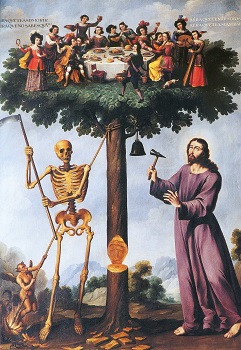
We have all heard the saying: "My life flashed before my eyes." What is going to flash before our eyes at the hour of death? One of Saint Alphonsus' eternal spiritual maxims is: "It is necessary to do what at the hour of death we would wish to have done." At the hour of death, what will we wish that we had done differently. When we look back on our lives, what does it look like.
The whole life of Christian should be a preparation for death. We should always be looking at what we are doing and measuring in regard to eternity. Is that fleeting pleasure really worth it? Oh, we are going it for a few minutes, but is it bringing us closer to God or further away from Him?
We need to remember that we are only exiles here, that this is not our true home. "Tell me" says St. John Chysostom, "if you were elected king but were obliged to spend the night preceding your entrance into your capital city where you were to be crowned, if you were compelled to pass that night in much discomfort in a stable, would you not joyfully endure it in the expectation of your kingdom? And why should not we, in this valley of tears, willingly live through adversities, in expectation of one day obtaining the kingdom of heaven?" Notice Chrysostom compares our time here on earth to a night and our time in heaven to the rest of our life. This is a night, and we sleep through a large part of it, even if not so well in a stable. When we arrive in the kingdom of heaven we will find true peace, serenity and rest.
Let us consider we are traveling to our new home a thousand miles away. We plan a stop half way to spend the night and reserve a room there. When we arrive about five in the evening and get into the room, the room is painted the ugliest color we can imagine. We run out and buy some paint and a paint brush and grab a burger and fries on the way back to the room. We quickly eat then repaint the room, staying up until midnight. We go to sleep exhausted, knowing the room will not be an ugly color, when we need to wake up in a few hours to finish our trip. Anyone who did this would be considered crazy, and yet that is what we are doing here on earth. We are more concerned about our stop over here, than about our new home in heaven.
"Lay not up to yourselves treasures on earth: where the rust, and moth consume, and where thieves break through and steal. But lay up to yourselves treasures in heaven: where neither the rust nor moth doth consume, and where thieves do not break through, nor steal." (Matthew 6:19-20)
Are we laying up treasures in heaven or are we piling up earthly treasures, which can be taken away from us? Are we really doing what we will wish we had done, when the hour of death comes upon us?

How to Manifest Our Dreams This 2021?

Likewise the Magi brought gifts to Bethlehem. They brought gold, frankincense and myrrh. They brought an offering to Jesus Christ. Gold representing Christ's Kingship on earth, frankincense representing Christ being Divine, and myrrh as a symbol of His death.
Somebody asked me, "What's in store for us this year 2021?" I simply replied, "It depends on what you bring to 2021." If you bring hatred, you will have hatred in return; if you bring magnanimity, you will withdraw good will; if you sow jealousy, you will reap division; but if you sow kindness, you will reap favor and blessings. 2021 blessings depends upon your choice. It depends on what you bring to 2021.
Matthew 6:33 says, "Seek ye first the kingdom of God and all shall be added unto you." In order to realize our dream this 2021 we need to surrender ourselves to Jesus in the manger. Allow Him to be king of your life. Start meditation on His promises. Start speaking His words. Never expect blessings if you are speaking curse into your life. Expect health, prosperity and happiness by speaking health, prosperity and happiness.
I repeatedly tell my parishioners, "What you are is God's gift to you, what you become is your gift to God." A Blessed New Year!

The Funny Pharmacy
A joyful mind maketh age flourishing: a sorrowful spirit drieth up the bones. - Proverbs 17:22
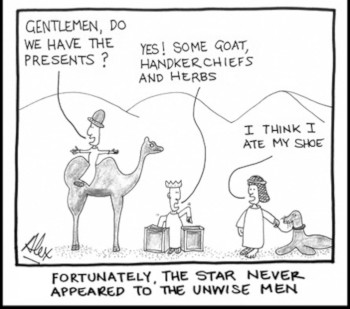





Frequently Asked Questions

Could Jesus Have Sinned?
Jesus, who is sinless, had to be tempted. That is quite a mystery. Why did He have to be tempted? In Matthew 4, we read that the devil came to Him and tempted Him. Three of the temptations are mentioned there. And in Hebrews 4:15 we are told that He was tempted in every respect like us but He didn't sin even once. It is amazing that Jesus Christ, the perfect sinless Son of God, was also subject to temptation in every area. The Bible says in Hebrews 6:20 that Jesus is our forerunner. Forerunner means somebody who has run the race in front of us and has shown us the path in which to follow. So, as One who has gone in front of us, He says to us today, "Follow Me."
The Bible says in Hebrews 12:1-2, "And therefore we also having so great a cloud of witnesses over our head, laying aside every weight and sin which surrounds us, let us run by patience to the race proposed to us: Looking on Jesus, the author and finisher of faith, who having joy set before him, endured the cross, despising the shame, and now sitteth on the right hand of the throne of God." Again we read, "For think diligently upon him that endured such opposition from sinners against himself; that you be not wearied, fainting in your minds.For you have not yet resisted unto blood, striving against sin:" (Hebrews 12:3-4) Jesus endured every temptation that can ever come to any human being. He was tempted in every point as we are and He overcame in the power of the Holy Spirit, as a man. If He had faced temptation as God, there would be nothing great about it. In fact, the Bible says that God can't be tempted (James 1:13).
So Jesus had to give up that privilege, when He walked on earth as a man, in order to be tempted, in order to be an example for us. If He overcame temptation in the power of God, and He, as God, tells us - human beings to somehow overcome, when we are not God, it would be like a father driving a car at 80 miles per hour, and telling his little son to run after him on the road, 'Follow me.' Isn't that ridiculous? - A father driving in a car at 80mph and telling his son to run after him? Then how can Jesus say, 'Follow me,' if He encountered temptation as God? In fact, in any case, as I said earlier, God cannot be tempted.
The fact is that Jesus encountered temptation as a man and overcame in the power of the Holy Spirit. And that is the same power He offers us. That is what gives us hope when we face temptation. The devil would like to rob you of that hope, by trying to tell you, 'No, you can't overcome temptation. You will always be defeated.' But you tell him, 'How did Jesus overcome?' He might say, 'Oh, He overcame as God.' Is that what the Bible says? No. He overcame Satan by quoting the word of God to Him. You can overcome Satan in the same way. The Bible asks you to take the sword of the spirit, which is the Word of God, and you can drive the devil away too, in the power of the Holy Spirit. Jesus prayed, sought for help, and overcame.
Suppose today we have to face some temptation, which Jesus never faced, we could say to Him, 'Well, Lord you don't understand what I am facing.' But we can never say that because He does understand. The Bible says He can sympathise with our struggle, with our weakness (Hebrews 4:15). The one thing that Jesus demonstrated though His life on earth was that with the power of the Holy Spirit, as a man, we can obey every commandment of God. If we don't do it, it is because we are not wholehearted as He was. That is why the Bible says, "He that saith he abideth in him, ought himself also to walk, even as he walked." (1 John. 2:6). Is that possible? If it is not possible there would be no such command in scripture.
Jesus Christ's life was a demonstration of how we are to live. Now, we may not be able to say that we are walking like Christ. In fact, I have never met anyone on earth who walks like Jesus Christ, neither would you have. But if we make that our goal and, if we have faith, we should press on to that perfection where we say, 'Lord I want to walk like You.' Then from one degree of glory to another, the Holy Spirit will conform us to Christ's likeness.
Paul said he hadn't attained it himself, but he was pressing on. He said that He pressed toward the mark, for the prize of the high calling of God in Christ Jesus. He wanted to live like Jesus lived. He made that his goal and, little by little, he approached it. But a person, who has no goal, is never going to get anywhere near there. It is like climbing a mountain. If you don't have the top of the mountain as your goal, what is going to happen? You are just going to be at ground level, even after 25 years. But if you keep the top of the mountain as your goal, every year will find you higher and higher and higher and higher, and little more and little more and little more like Christ. This is Christian growth. How did Jesus overcome? When He faced temptation and He felt the pull of it, He resisted it in the power of the Holy Spirit; He died to Himself and He overcame. That is why the Bible says, "Arm yourself with the same thought" (1 Peter 4:1-2).
Now there could be a misunderstanding here because some of us don't understand what is the essence of sin. The essence of all sin is doing your own will. Now, if that is the essence of sin, then what is the essence of holiness? Denying your own will and doing the will of God. That is holiness. We read what Jesus said in John 6:38, "Because I came down from heaven, not to do my own will, " -not to sin,- "but the will of him -God the Father- that sent me " That is holiness. In the Garden of Gethsemane He said, "Not as I will Father, but as Thou will." Jesus offered up His human will as a perpetual sacrifice. He said, "I never want to do My will." That is what is meant by Jesus never sinned. He never did His own will. Human nature is just the opposite. We see that in a little child; a child wants to do his own will. That stubbornness is sin.
Jesus warned His disciple in the Garden of Gethsemane. He said, "Pray, your flesh is weak. Your spirit may be willing to live a holy life but your flesh is weak." That is why we need the power of the Holy Spirit to deny our will and to do the will for God.
For answers to more frequently asked questions, click here: https://www.vaticaninexile.com/frequently_asked_questions.php
The Pope Speaks: January 2021
Fatima Is a Distraction

To some this may sound like blasphemy? Wasn't the Miracle of the Sun one of the greatest events of modern history? Wasn't your own father converted by Fatima? All of this is true and the message of Fatima is important.
We have been following Fatima and Marian apparitions for decades. Today's discussion of Fatima is nothing like it was a half of a century ago. Today Mary's message has gotten buried and is little discussed. Instead there is much conversation about the Third Secret of Fatima and what is coming upon the world.
We have read about many approved Marian apparitions and there is a common theme throughout, repentance and prayer.
Let us go back to La Salette about which there is much fruitless discussion. How many know the real message of La Salette? In the public apparition Mary decried three sins. First she decried the violation of the Lord's Day: "Six days have I given you to labor, I have reserved the seventh to myself; yet you will not give it to me. It is this that makes my Son’s hand so heavy." Then she decried the sin of blasphemy, which is all too common today. "Wagoners cannot swear without introducing the name of my Son. These two things are what makes the hand of my Son so heavy." This sin is so common, we often share on Facebook a video We made: 'Three Letter Ticket to Hell'
Finally Mary said: "In summer, only a few old women go to Mass on Sunday. The others work. In winter, they have nothing else to do, the boys go to Mass just to mock at religion. The world takes no notice of Lent. People go to the butchers like dogs." This apparition occurred on Ember Saturday in September, a Fast Day. How many traditional minded Catholics observe the pre-Vatican II fast? Instead most go to the butcher's like dogs.
Then there is the Secret of La Salette, which is much discussed, although it is on the Index of Prohibited Books. We know for certain it is false, because when Melanie wrote it out originally she asked about two things, infallibility and Antichrist. Infallibility does not occur in the versions of the secret in circulation. Pope Pius IX was asked about the secret, which he had read. His answer was to quote Scripture. "No, I say to you: but unless you shall do penance, you shall all likewise perish." (Luke 13:3) Then he said that is all we need to know. John the Baptist said: "Do penance: for the kingdom of heaven is at hand." (Matthew 3:2) A footnote in the Bible says: "Penance: Which word, according to the use of the scriptures and the holy fathers, does not only signify repentance and amendment of life, but also punishing past sins by fasting, and such like penitential exercises." So Pope Pius IX said that Mary indicated we need to repent.
Repentance is a common theme of Marian apparitions. She has come often to decry some sin that is rampant, especially violation of the Lord's Day. The theme of Fatima is repentance and prayer. If people had repented World War II could have been avoided. We didn't. Instead we became worse and are continuing to do so.
Over a decade ago We were sent a book, False Friends of Fatima. It stated that Sister Lucy wanted to speak to the world about Fatima in 1959, but the Vatican silenced her in the middle of the year. Had the Third Secret already become clearer? We will never know. We do know that the apostasy spoken of by Saint Paul in II Thessalonians 2 was beginning. The rest of the book convinced Us that the authors are also false friends of Fatima.
There is a little known miracle in 1953 in Syracuse, Italy. A cheap plastic statue of the Blessed Virgin Mary began to cry. A priest wrote a book about this, and his conclusion is that Mary has come many times asking for conversion and repentance. In 1953 like a Mother with a recalcitrant juvenile delinquent for a child, all she can do is cry.
Unless you are repenting and removing sin from your life and becoming a Saint, Fatima is a distraction as you have missed Mary's main message throughout history. Remember Mary leads us to Jesus.
As for secrets, several visionaries received secrets, which were never revealed. Maybe if people had repented, the third secret would have been revealed. It really doesn't matter. Sacred Scripture points the road to heaven and now two Popes have pointed out that road: "Unless you repent (do penance) you shall all likewise perish." (Luke 13:3, 5)


Saint Mark the Ascetic
On The Spiritual Law

61. Scripture says: 'Hell and perdition are manifest to the Lord' (Prov. 15:11. LXX). This refers to ignorance of heart and forgetfulness.
62. Hell is ignorance, for both are dark; and perdition is forgetfulness, for both involve extinction.
63. Concern yourself with your own sins and not with those of your neighbor; then the workplace of your intellect will not be robbed.
64. Failure to do the good that is within your power is hard to forgive. But mercy and prayer reclaim the negligent.
65. To accept an affliction for God's sake is a genuine act of holiness; for true love is tested by adversities.
66. Do not claim to have acquired virtue unless you have suffered affliction, for without affliction virtue has not been tested.
67. Consider the outcome of every involuntary affliction, and you will find it has been the destruction of sin.
68. Neighbors are very free with advice, but our own judgment is best.
69. If you want spiritual health, listen to your conscience, do all it tells you, and you will benefit.
70. God and our conscience know our secrets. Let them correct us.
Saints from East and West

January 30 - Blessed Sebastian Valfrè.
Sebastian Valfrè was born at Verduno in Piedmont in 1629. His parents were poor and had a large family to support. From his childhood he determined to become a priest, and all through his years of study he maintained himself by copying books, costing his father nothing. We are told that all his parents were ever able to give him was a cartload of wine when he first left home.
He was accepted by the Fathers of the Oratory at Turin, and joined the congregation on Saint Philip's day, 1651. He received the priesthood a year later, and for his parents' consolation offered his first Mass at Verduno. He gave himself up at once and unreservedly to his priestly duties, and it was noted that from the time of his joining it, the Turin Oratory, which had previously had much to contend with, began to make many friends and to prosper exceedingly. Sebastian's first office was that of prefect of the Little Oratory, a confraternity of laymen who meet together for devotional exercises. This charge he retained for many years with abundant fruit, and his wonderful gift for inspiring enthusiasm in the young seems to have led a little later to his being appointed master of novices. In 1661, almost immediately after he had reached the required age of forty years, he was elected superior in spite of his own earnest remonstrances. We are told that his government was a perfect copy of that of Saint Philip, enforcing exact observance in every detail, but showing great tenderness to the sick, for whom nothing was thought too good.
During all this time Blessed Sebastian's fame as a director of souls was constantly growing. He spent long hours in the confessional, being scrupulous in the regularity of his attendance, a matter upon which he laid much stress in his exhortations to his own community. All classes came to him, and he was prepared to bestow endless care on those whom he saw in need of help or earnest to make progress. On the other hand, aided probably by a supernatural insight, he was ruthless in exposing insincerity and affectation. Amongst his penitents was the Duke Victor Amadeus II, afterwards king of Sardinia, who endeavoured in 1690, with Pope Alexander VIII's ready consent, to induce Father Sebastian to accept the archbishopric of Turin, but all to no purpose. He preached sometimes as many as three sermons in one day. He also went on long missionary expeditions in the surrounding country, penetrating occasionally into Switzerland, and wonderful were the conversions which followed. Besides this, much time was devoted to instructing the young and the ignorant. He gathered together the beggars who came to the Oratory for alms, and provided food for their souls as well as for their bodies. He was indefatigable in visiting hospitals and prisons, displaying, moreover, a special affection for soldiers, whose peculiar temptations he understood and compassionated.
Like Saint Philip, Blessed Sebastian was always cheerful, so that men judged him to be light-hearted and free from care. This was the more wonderful because we read a terrible story of his own spiritual desolation and interior trials. He was haunted by temptations to think that he was forsaken of God, that he had lost his faith, and that nothing but Hell awaited him; yet all the while, even when he was close upon eighty, he never relaxed his apostolic work for souls, preaching out of doors in the bitter cold of January to any company of waifs and outcasts whom he could gather round him. We find him at times fearless in visiting even haunts of vice when he felt that God called him to interfere. Strange to say, his intervention on these rare occasions seems to have been wonderfully blessed, and the most brutal ruffians felt the power of his holiness, remaining abashed and dumbfounded when he denounced them in no measured terms. His life was, in fact, the model of that which ought to be led by a zealous pastor in a city where misery and evil abound, and it is in no way wonderful that he was regarded by all his contemporaries as a saint. Instances of his supernatural insight and of the fulfilment of his predictions were many. Amongst other such cases which are on record, it seems clear that he knew, some months beforehand, the time of his own death. This occurred on January 30, 1710, when he was close upon eighty-one years of age. He was beatified in 1834.

25 January - Saint Gregory the Theologian.
Sainted Gregory (Nazianzus) the Theologian, Archbishop of Constantinople, an ecumenical father and teacher of the Church, was born into a Christian family of eminent lineage in the year 329, at Arianzos (not far from the city of Cappadocian Nazianzus). His father, likewise a Sainted Gregory, was Bishop of Nazianzus; but of these two father and son, the son is the Saint Gregory Nazianzus encountered in Patristic theology.
His mother, Saint Nonna, prayed God for a son, having given a vow to dedicate him to the Lord. As was revealed to her in a dream, she accordingly named her first-born Gregory. When the son learned to read, his mother presented him with the Holy Scripture. Saint Gregory received a quite complete and extensive education: after working at home with his uncle Saint Amphylochius, an experienced teacher of rhetoric, he then studied in the schools of Nazianzus, Caesarea Cappadocia and Alexandria. Then for the finishing touches to his education, the saint set off to Athens.
On the way from Alexandria to Greece, during the time of a terrible storm of many days, he was apprehensive only that "the murderous waters would deprive him of the waters of cleansing." "For twenty days and nights,” relates Saint Gregory, “I lay at the ship's stern, beseeching the merciful God for salvation, and at this perilous time I gave a vow to dedicate myself to God, being saved through this vow."
The saint spent six years at Athens, and there studied rhetorics, poetics, geometry, and astronomy. His teachers were the renowned pagan rhetoricians Gymorias and Proeresias. Together with Saint Gregory, there also studied there Saint Basil, the future Archbishop of Caesarea Cappadocia. Their friendship, formed while still back in school in Caesarea, flourished in a deep spiritual closeness. But their acquaintance with Julian, the future emperor (361-363) - and apostate from the Christian faith - soon turned into implacable enmity.
Upon completing his education, Saint Gregory remained for a certain while at Athens and taught the rhetoric eloquence of speech. He knew well the pre-Christian pagan philosophy and literature.
In the year 358 Saint Gregory quietly quit Athens and returned to his parents at Nazianzus. And here he at almost 30 years of age received Baptism from his father. Since now it was for him "become more significant to be a follower of God, than foremost with the emperor," he vacillated only on which way was to be "the preference: contemplative or practical."
At the suggestion of Saint Basil he withdrew into the wilderness, so as to asceticise alongside him.
But at the demand of his father, Saint Gregory returned to Nazianzus in 361 and received the dignity of presbyter. Sensing however, that solitude and silent prayer were immeasurably closer to his liking than pastoral activity, Saint Gregory again hastened into the wilderness to Saint Basil. There in the wilderness he strengthened in spirit, found the wherewithal to return to his flock and properly do his duty. And there soon befell Saint Gregory the hard task of reconciling the bishop with his flock, which condemned their pastor for signing an ambiguous interpretation of the dogmas of the faith. Saint Gregory gave the flock time for expression of feelings first, and then he convinced his father to openly acknowledge his mistake. After this, and uttering a sermon on the need for reconciliation, Saint Gregory accomplished his intent. Sainted Basil the Great made Saint Gregory bishop of the city of Sasima, but in order to assist his dying father, Saint Gregory remained at Nazianzus, and for a certain while after the death of his father he guided the flock of this city.
Upon the death of the Constantinople patriarch Valentus in the year 378, the Antioch Council invited Saint Gregory to help the Constantinople Church, which at this time moreso than at others was ravaged by heretics. Having received the consent of Saint Basil the Great, Saint Gregory came to Constantinople upon the Patriarchal throne. In the year 379 he began to serve and preach in a not-large house church of his kinsmen. He named this church "Anastasis" ("Voskresenie" or "Resurrection"), believing that in this small church he would begin to resurrect Orthodoxy. Heretics ruled everywhere - whether they be Arians or Appolinarians. And the more loudly resounded his preaching, the more fully increased the gathering in church, and by this more bitterly grew the opposition of the heretics. On the night of Pascha, 21 April 379, when Saint Gregory was making Baptism of the newly-illumined, a mob of armed heretics burst into the church and showered an hail of rocks upon the Orthodox, killing one bishop and wounding Saint Gregory. But the fortitude and mildness of the saint were his best armour, and his words regathered the Orthodox.
The compiled works of Saint Gregory - discourses, letters, verses - all show that he strove to be a worthy preacher of the truth of Christ. A gift of words was bestowed to him, and the saint sought to offer it in gift to God the Word: "This gift offer I up to my God, this gift I do dedicate to Him: this alone, is what I have remaining as my riches; I gave up all else at the command of the Spirit; everything that I had, I gave in exchange for the pearl of great price. Only in words do I master it, as a servant of the Word; never intentionally would I wish to disdain this wealth, I esteem it, I set value by it, I am comforted by it more, than others are comforted by all the treasures of the world. It is the companion of all my life, a good counselor and converser; a guide on the way to Heaven and a fervent co-ascetic." In order to worthily preach the Word of God, the saint assiduously prepared and revised his works.
In five Sermons - "Discourses on Theology" - dealing with those inclined towards the verbose reasonings of Eunomius, Saint Gregory first of all gives a precise definition, who it is from whom and when that they can theologise. Only those who are experienced can properly reason about God, those successful at contemplation and, foremost of all, pure in soul and body, or in utmost measure cleansed of self. To reason about God properly is possible only for one who enters into it with fervour and reverence. Explaining that God has concealed His Essence from mankind, Saint Gregory demonstrates that "by means of flesh it is impossible to view mental objects without admixture of the corporeal." To theologise talking about God in a positive sense is possible only when we become free from the external impressions of things and from their affects, when our guide - the mind - does not adhere to impure transitory images.
The fame of the Orthodox preacher spread through East and West. But the saint lived in the very capital just as though he lived still in the wilderness. "His food was food of the wilderness; his clothing - whatever necessary; his making of rounds was without pretense, and being in proximity of the court - he sought nothing from the court." During a time of sickness the saint was given a shock. One whom he reckoned as his friend, the philosopher Maximus, was consecrated in place of Saint Gregory at Constantinople. Struck by the ingratitude of Maximus, the saint decided to resign the cathedra, but his faithful flock restrained him from it. The people threw the usurper out of the city. On 24 November 380 the holy emperor Theodosius arrived in the capital and, in enforcing his decree against the heretics, the chief church was returned to the Orthodox, with Saint Gregory solemnly making entrance. Soon an attempt on the life of Saint Gregory was in the offing, but the one who was to be the assassin instead appeared before the saint with tears of repentance.
In the year 381 at the Second Ecumenical Council, Saint Gregory was confirmed in the dignity of Constantinople Patriarch. Upon the death of the Antioch Patriarch Meletius, Saint Gregory presided at the Council. Hoping to reconcile the West with the East, he offered to recognise Paulinus as Antioch Patriarch. But with the arrival of those who earlier had acted against Saint Gregory on the side of Maximus - particularly Egyptian and Macedonian bishops - they did not want to acknowledge the saint as Patriarch of Constantinople. Saint Gregory decided to sacrifice himself for the peace of the Church: "Let me be as the Prophet Jonas! I was guilty for the storm, but I would sacrifice myself for the salvation of the ship. Grab hold and throw me... I was not happy when I ascended the throne, and gladly would I descend it." Having explained to the emperor about his wish to quit the capital, Saint Gregory appeared again at the Council, in a farewell address asking it to let him depart in peace.
Upon his return to his native region, Saint Gregory concerned himself about the incursion of Appolinarian heretics into the Nazianzus flock, and he established there as bishop the pious Eulalius, while he himself withdrew into the solitude of Arianzus so dear to his heart. Not forsaking the wilderness, the saint with zeal for the truth of Christ continued to affirm Orthodoxy through his letters and verses. In the year 389 he died, on 25 January, being honoured by the Church with the title "Theologian" bestown also on that beloved disciple of Christ - the holy Evangelist and Apostle John.
The body of Saint Gregory was buried at Nazianzus. In the year 950 the holy relics were transferred to Constantinople into the church of the Holy Apostles. Later on part of the relics were transferred to Rome. Tradition has preserved the features of the saint as: "a face humble, pale, eyebrows standing up thick, a meek glance, beard not long, but thick and broad." His contemporaries already called the archpastor a saint.


Books to feed your faith!
Instructions For Preachers: Getting Your Message From the Pulpit to the Pew
$9.95
Saint Alphonsus Marie de Ligouri presents the proper method of preaching, that will move hearts to repentance and encourage people to live a virtuous way of life. The first chapter is devoted to this method of preaching, which is opposed to the showy method of many preachers of his day and even ours. Many seek to gain the praise of their listeners, rather than to bring them to repentance and educate them in the way of salvation. Saint Alphonsus, following the example of Saints Francis de Sales and Vincent de Paul sought to teach priests how to make saints and save souls rather than impress audiences. The second chapter refutes a critis. Saint Alphonsus begins by explaining the criticism: “My critic, you say, maintains that, though sacred orators should preach in a clear and orderly manner, they should never condescend to speak in a popular style; because, according to him, such a style is unworthy of the dignity of the pulpit and degrading to the word of God.” He then proceeds to defend his position and give further useful instructions to preachers. The third chapter is the refutation of a book On Preaching by the Author of the Philosophical Dictionary, whose name is unknown. Saint Alphonsus describes this book as follows: “Moreover, on seeing the title of the work, On Preaching, one would have thought that it treated of the utility and even of the necessity there is in this world of preaching to the people in order to enlighten them, because in consequence of sin and the corruption of their nature they are enveloped in darkness, and naturally inclined, not to what is good and virtuous, as the author wishes, but to evil and to vices. Now this is not the case: the end of the work is to discredit preaching, by representing it as entirely useless for the reformation of morals.” He then proceeds to outline the author's case and then present his case. Contained here are more useful recommendations to preachers. Finally, we close with a chapter on the usefulness of missions. This has been excerpted from The Complete Works of Saint Alphonsus, which was compiled and translated by Father Eugene Grimm. (1835-1891) All is excerpted from a much larger work on Preaching, and serves as an excellent guide for anyone who enters the pulpit.

Commentary on the Book of Psalms
By Saint Robert Bellarmine
$24.95
The print of this edition is 12 point, larger than an earlier edition in print. In these days the Psalms are little used in the private devotions of lay Catholics; and forms of prayer, which have no authoritative sanction, and which are often little recommendable, either for sentiment or expression, are used, instead of those which have been dictated by the Holy Ghost. The reason of this notable change in the practice of the faithful must be that they do not understand the Psalms. This work was prepared for the use of the laity, but clergy and religious will find it very useful in understanding the psalms they pray in the Divine Office.
Saint Alphonsus Ligouri -Charity is patient, is kind: charity envieth not, dealeth not perversely; is not puffed up; Is not ambitious, seeketh not her own, is not provoked to anger, thinketh no evil; Rejoiceth not in iniquity, but rejoiceth with the truth; Beareth all things, believeth all things, hopeth all things, endureth all things. (I Corinthians 13:4-7) Saint Paul wrote wonderfully about charity in the 13th chapter of First Corinthians. Saint Alphonsus takes these words and gives a simple view of the Catholic way of life and an excellent introduction into the spiritual life. This is excerpted from his work, The Holy Eucharist, which has been excerpted from The Complete Works of Saint Alphonsus, which was compiled and translated by Father Eugene Grimm. (1835-1891)
Will the Real Catholic Church Stand Up?
Kindle $2.99 / Paperback $9.95
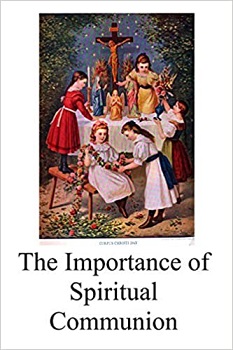
The Importance of Spiritual Communion
Kindle $2.99 / Paperback $5.99
If we cannot receive Holy Communion actually, then let us do so spiritually. These prayers and instructions have been gathered from the Saints and other venerated spiritual writers. Spiritual Communion has been a part of the spiritual life for decades. Growing up I was instructed to make a Spiritual Communion, when I could not go to Communion such as when I assisted at a second Mass. The same is true if one finds oneself at Mass, but not fasting. There are times coming, when it will be difficult, if not impossible to assist at the Holy Sacrifice of the Mass. We should be prepared for such times.
For More Good Traditional Catholic Books:

Mother's Own Easy Basic Biscuits

Prep: 15 mins
Cook: 10 mins
Total: 25 mins
Yield:8 to 12 biscuits
Ingredients
2 cups all-purpose flour
1 tablespoon baking powder
½ teaspoon salt
½ cup shortening
¾ cup milk
Directions
1 Preheat oven to 450 degrees F (230 degrees C).
2 In a large mixing bowl sift together flour, baking powder and salt. Cut in shortening with fork or pastry blender until mixture resembles coarse crumbs.
3 Pour milk into flour mixture while stirring with a fork. Mix in milk until dough is soft, moist and pulls away from the side of the bowl.
4 Turn dough out onto a lightly floured surface and toss with flour until no longer sticky. Roll dough out into a 1/2 inch thick sheet and cut with a floured biscuit or cookie cutter. Press together unused dough and repeat rolling and cutting procedure.
5 Place biscuits on ungreased baking sheets and bake in preheated oven until golden brown, about 10 minutes.
Overnight Eggs Benedict Casserole

Prep: 20 mins
Cook: 50 mins
Additional: 8 hrs
Total: 9 hrs 10 mins
Yield: 1 9x13-inch casserole
Ingredients
8 large eggs
2 cups milk
3 green onions, chopped
1 teaspoon onion powder
1 teaspoon salt
¾ pound Canadian bacon, cut into 1/2-inch dice
6 English muffins, cut into 1/2-inch dice
½ teaspoon paprika
1 (.9 ounce) package hollandaise sauce mix
1 cup milk
¼ cup margarine
Directions
1 Spray 9x13-inch baking dish with cooking spray.
2 Whisk eggs, 2 cups milk, green onions, onion powder, and salt together in a large bowl until well mixed.
3 Layer half the Canadian bacon in the prepared baking dish. Spread English muffins over meat and top with remaining Canadian bacon. Pour egg mixture over casserole. Cover baking dish with plastic wrap and refrigerate overnight.
4 Preheat the oven to 375 degrees F (190 degrees C).
5 Sprinkle casserole with paprika; cover with aluminum foil.
6 Bake in preheated oven until eggs are nearly set, about 30 minutes; remove foil. Continue baking until eggs are completely set, about 15 more minutes.
7 Whisk hollandaise sauce mix with 1 cup milk in a saucepan. Add margarine and bring to a boil, stirring frequently. Reduce heat to medium-low, simmer, and stir until thickened, about 1 minute. Drizzle sauce over casserole to serve.
Video sermons and instructions: Timeless timely truths for living the Faith
Epiphany 2013
Holy Name of Jesus 2011
Circumcision Sermon 2017
Sunday Sermon: A Man With No Name
Music: Wise Men Still Seek Him

Encouragement for Today
Therefore encourage one another and build one another up.... I Thessalonians 5:11
We believe that through our assorted podcasts, Vlogs, audio downloads and devotional blogs, you will find an assorted Treasure Chest of...
- Sermons
- Classic Catholic Audio Books.
- Devotionals
- Scripture Studies
- Catechism Lessons
- Old-Time Christian radio programs
- Catholic Videos
...that will be a help in your faithful walk with the Lord.
LEARN MORE AT THE ENCOURAGEMENT FOR TODAY WEBSITE: https://www.encouragementfortoday.com
Male and Female
"God created them male and female; and blessed them: and called their name Adam (mankind), in the day when they were created."

“God created them male and female.” That simple phrase heaps a world of problems on those who believe in evolution.
Evolutionists tell us that in the early stages, evolution would have produced creatures that reproduce without the need for male and female. They then suppose that some mutation would have produced the gender differences, but what advantage would these differences offer? Quite the contrary, these differences would be a disadvantage and become quickly selected out. An even more serious problem is that, according to evolution’s history of life, the male and female sexes must have developed in different kinds of creatures dozens of times.
No one has the slightest idea how one or a dozen mutations could have produced male and female. To change a creature from having no gender into a male or a female requires developing several new organs, changing some others, creating entire, new hormone systems, and changing others. New organs and systems would have to be immediately integrated into the workings of the rest of the body. In addition, the independently developed male changes would have to work with the independently developed female changes. Changes would also have to be made in the brains of the new creatures so that they would want to mate with each other. And evolutionists tell us this must have happened dozens of times!
Yes, that simple phrase “God created them male and female” leaves evolution with an imponderable mystery. This mystery is solved easily by God’s Word. What a mistake it is to say that the Bible is obsolete in our modern scientific era!
Catechism Catch-Up
The Seventh Commandment: Lesson 14
Stealing is a subject well worth our attention for several reasons.
First, stealing has become a national problem of epidemic proportions. For example, consider the impact of “time theft” on our economy:
One company has calculated that time-theft will cost the American economy as much as $70 billion a year. Time-theft is defined as those deliberate employee actions which result in the massive, growing misuse and waste of time. Estimated time-theft are: arriving to work late, leaving early, taking unjustified ‘sick’ days, extensive socializing with co-workers, turning the water cooler into a conversation pit, inattention to the job at hand, reading novels and magazines while on the clock, operating a business on the side during working hours, eating lunch at the desk and then going out for the ‘lunch hour,’ excessive personal phone calls, on-the-job daydreaming and fantasizing, long, frequent coffee and snack breaks, etc.
Second, our culture sends us “mixed signals” as to how serious a problem stealing is.
On the one hand, stealing is taken very seriously, when compared with some other evils. An adulterer is not even punished by the Law enforcement agencies any longer, even though there may be laws against it. A person may be given a lengthy sentence for misappropriating money, like banking violations, while another may serve less time for murder. On the other hand, stealing is often romanticized in the media. Television programs portray police officers as either inept or bound by the Law from apprehending the villains, and so the private eyes always get their man, often by the use of a “pick” to break into locked quarters, where they steal incriminating evidence.
Third, stealing is a much more complex problem in our society than it was in the days of ancient Israel.
In the ancient world, very tangible objects were stolen: cattle, property, wives, and the like. One could hardly argue that he had not taken anything if it were found in his possession. On the other hand, we now live in an age of sophisticated technology. For example, we have ideas which are patented and materials which are printed, both of which can be stolen. Credit cards and electronic banking have made matters even more complicated. And then there are the electronic gadgets. Satellite dishes are available to “steal” electronic signals from the sender, electronic recordings may be duplicated, so that the owner does not get any remuneration for his labor. And now there is computer software, much of which can be copied in seconds, making it possible for thousands of dollars worth of programming to be obtained for the few pennies it costs for a diskette.
Fourth, stealing is often viewed as an evil for the wrong reasons.
Usually we think of stealing as a violation of the right of private property. While this may be true, I believe that there are much more serious problems than this, which we shall explore.
Finally, stealing is a serious sin because it is included in the Ten Commandments, which identifies the “ultimate evils” of Israel’s day, and of our own as well.
I have come to view the evils prohibited by the Ten Commandments as the “ultimate evils” which God prohibits. There are other evils, but they are condemned under one of the “ultimate evils.” For example, if it is wrong to kill our neighbor, it is also wrong to do bodily harm to him, or to destroy his reputation (as spoken about in the Sermon on the Mount). If it is wrong to commit adultery, it is also wrong to practice other sexual sins. In our society, since first degree murder is wrong, then so is second degree murder or manslaughter. (And so one charged with first degree murder may be charged with any lesser offense. But one charged with a lesser offense cannot be charged with a greater, of the same kind.) The greater offense thus includes the lesser.
In this lesson I want us to explore the nature of stealing, and end up with a concise definition. This will give us away to explore some of the ways in which we steal today. Finally, we will conclude by focusing on the biblical solution for stealing, as prescribed in the Scriptures.
Stealing—Its Categories
Broadly speaking, stealing falls into two categories: active stealing and passive stealing. Active stealing aggressively, willfully, maliciously takes what belongs to someone else, through a variety of means. In Leviticus chapter 6 we find several forms of active theft identified:
“The Lord spoke to Moses, saying:
Whosoever shall sin, and despising the Lord, shall deny to his neighbour the thing delivered to his keeping, which was committed to his trust; or shall by force extort any thing, or commit oppression;
Or shall find a thing lost, and denying it, shall also swear falsely, or shall do any other of the many things, wherein men are wont to sin:
Being convicted of the offence, he shall restore
All that he would have gotten by fraud, in the principal, and the fifth part besides to the owner, whom he wronged.
Moreover for his sin he shall offer a ram without blemish out of the flock, and shall give it to the priest, according to the estimation and measure of the offence:
And he shall pray for him before the Lord, and he shall have forgiveness for every thing in doing of which he hath sinned.” (Leviticus 6:1-7).
(1) Embezzlement. Embezzlement is the misuse or misappropriation of something that has been entrusted to us (Leviticus 6:2). Embezzlement is a violation of trust, for what has been placed in a person’s keeping has been appropriated for selfish purposes. Embezzlement is frequently an offense of a bank employee or of a comptroller of a corporation.
(2) Robbery. Robbery is the act of taking what belongs to another (Leviticus 6:2). Robbery, I believe, is a broad definition, covering several kinds of stealing. Robbery generally takes things directly, often by the use of superior force (frequently involving a weapon). Stealing suggests stealth. A pick-pocket for example, uses stealth, as does a burglar. Fraud may also be included here. If so, fraud involves getting what belongs to another by deception. Here, the victim often gives what is stolen to the thief, thinking that doing so will be profitable. The only one who profits, however, is the thief.
(3) Extortion. Extortion gains possession of another person’s property by the illicit use of authority or of force (not a weapon, however). Sometimes, charging an excessive price is included here, if one feels compelled to buy the product. For example, if your child was seriously ill and there was only one medicine which would cure the child, you would be willing to pay almost anything to obtain it, even if the cost were excessive. In many parts of the world, Law enforcement officers use their position of authority to extort funds from those who are vulnerable. If a policeman could, by his false testimony alone, convict you of a crime that would imprison you, you would gladly pay his extortion fee to avoid the threatened punishment. Thus, John the Baptist told the tax gatherers and soldiers of his day:
“But he said to them: Do nothing more than that which is appointed you.
And the soldiers also asked him, saying: And what shall we do? And he said to them: Do violence to no man; neither calumniate any man; and be content with your pay.” (Luke 3:13-14).
(4) Kidnapping. In the ancient Near East, kidnapping was considered a form of theft (Deuteronomy 24:7), probably because the individual would be kept as a slave, rather than because he or she would be ransomed.
In addition to these “active” forms of stealing, there are a variety of “passive” forms of stealing.
While the thefts previously described wrongly took something from the possession of another, passive theft is the failure to give to another what belongs to them or is due them. For a variety of reasons, we may have in our possession what rightfully belongs to another, and yet fail or refuse to give it to them. While a more passive act, it is nevertheless stealing. The following forms of passive stealing are forbidden in the Bible:
(1) A man’s negligence which results in a loss to his neighbor. Exodus chapter 22 (verses 1-15) describes several acts of negligence which deprive a neighbor of his property, and which thus require restitution. For example, if a man’s pasture land has been grazed bare, and he therefore lets his animal loose, so that it grazes on his neighbor’s pasture, consuming it, the negligent man is guilty of passive stealing (Exodus 22:5).
(2) A man’s failure to return something lost to its owner is stealing. In Leviticus 6:3, the old saying, “finders keepers, losers weepers,” is shown to be an excuse for theft. To find what belongs to another, and not to return it, is to steal it, by one’s negligence or refusal to return it. Clear instructions regarding the returning of lost items is given in the Book of Deuteronomy:
“Thou shalt not pass by if thou seest thy brother's ox, or his sheep go astray: but thou shalt bring them back to thy brother.
And if thy brother be not nigh, or thou know him not: thou shalt bring them to thy house, and they shall be with thee until thy brother seek them, and receive them.
Thou shalt do in like manner with his ass, and with his raiment, and with every thing that is thy brother's, which is lost: if thou find it, neglect it not as pertaining to another.
If thou see thy brother's ass or his ox to be fallen down in the way, thou shalt not slight it, but shalt lift it up with him.
(Deuteronomy 22:1-4).
(3) Failure to give what belongs to another is stealing. A day laborer is to be paid at the end of the day (Leviticus 19:13; Deuteronomy 24:14-15). For an employer to keep a laborer’s wages, which at the end of his work day rightfully belonged to the worker, was to rob him. So, too, to keep back the tithes, by which the Levites were supported, would have been robbery ( Deuteronomy 18:1-8; 26:9-13). Withholding the charity which was to be shown to the poor, the alien, and the stranger, was also stealing. God instructed the Israelites to make certain provisions for the poor, such as leaving the corners of their fields unharvested (Deuteronomy 24:19-22). Whenever an Israelite became greedy and did not leave something behind for the poor, he was stealing from them, for God had given the gleanings to them.
READ MORE FROM THE TRADITIONAL CATECHISM AT THE WEBSITE: https://www.traditionalcatechism.com
Living Catholic:
What Is The Root Cause Of A Spirit Of Anger?
The Root Causes of Anger: recognizing and resolving hurts and guilt
Anger is a universal problem. It is not limited to one age group, culture, race, economic level, social status, educational background, or any other classification.
Unresolved anger is one of the chief contributing factors to the destruction of marriages, the breakdown of families, and the weakening of communities. It is a major cause of health problems and lack of productivity in the workplace, and it is a common denominator among juvenile delinquents.
Identify the Root Cause of Anger
Anger is a serious problem. What causes it? The root cause of a spirit of anger is tension from past hurts and guilt. This mixture of pain and guilt is cumulative and it erupts in anger when new offenses remind us of past experiences.
Most people assume that hurtful events in the past will be forgotten and will have no effect on the future. That is not true. Past hurts do not just go away, nor does guilt simply disappear after a wrong response to a situation. Unless these experiences are resolved through repentance and forgiveness, we will continue to experience bouts of anger when our tension points are triggered.
Recognize Pain From the Past
The following situations often lead us into bitterness, where we typically lash out in wrath, revenge, or other hurtful responses.
-
The pain of rejection
The pain of rejection is one of the strongest factors in a person’s life, especially in childhood. A child forms strong attachments to parents, friends, and relatives and finds security in these relationships. When those who are trusted communicate rejection, the child’s secure world collapses and he faces a host of fears. The pain of rejection and the torment of fears can cause the child to develop deep bitterness toward the one who is responsible for his pain. When parents get divorced, their children typically experience the pain of rejection.
-
The reaction to unchangeable features of our lives
One of the greatest challenges facing every young person is that of accepting unchangeable features, such as physical appearance, mental capabilities, birth order, race, brothers and sisters, and parents. When someone mocks or ridicules a child who is already insecure, it is a devastating blow to his self-esteem. Ridicule does not just attack a child’s actions—it mocks him as a person. One who experiences ridicule will be extremely sensitive to anyone else who ridicules him or others. The anger he feels is motivated by a desire for the just punishment of anyone who mocks others.
-
The grief of favoritism
When parents favor one child over another, they are not only damaging the self-worth of the child who is less appreciated, but they are also encouraging him or her to react toward the one who is favored. Favoritism to one will be seen as rejection by the other. The Biblical example of Jacob’s favor of Joseph over the rest of his sons is a classic example of this situation. Joseph’s brothers resented the favor Joseph received, and they sold him into slavery. Then they led Jacob to believe that Joseph had died. (See Genesis 39.)
-
The anguish of false accusations
A person’s reputation has great worth. Solomon wrote, “A good name is better than great riches: and good favour is above silver and gold.” (Proverbs 22:1). A false accusation not only damages the one who is accused, but it also stirs up indignation and a desire to see the false accuser brought to justice.
The mixture of guilt and pain that surrounds the memory of these experiences triggers anger when we hear of or face similar situations. Can you recall a past experience that deeply hurt you? How do similar situations cause you to express anger now?
Pinpoint Sinful Attitudes and Actions
Along with painful experiences, our own tendencies toward sin foster a spirit of anger. The following attitudes and actions lead to guilt and anger:
-
Pride
Pride is assuming authority that does not belong to us. Many conflicts arise simply because we step into another’s jurisdiction with efforts to control. No wonder others react to us in this situation. In turn, the rejection we experience as a result can then lead to more expressions of anger, which are often accompanied by bitterness.
-
Personal faults
When we fail in specific areas, we tend to be very alert to other people who fail in the same areas. Unfortunately, the frustration we have toward ourselves is often redirected to them through harsh judgment. Also, when someone hurts or offends us, his or her actions may be partially justified, which can trigger an explosive combination of guilt and bitterness.
-
Generalizations
If someone who represents another group or race hurts us, we tend to project the misbehavior of one onto the entire group and often develop a general animosity toward everyone who is associated with that group.
-
Expectations
When people make promises and fail to keep them, we tend to hold that against them and become resentful of their failure to fulfill our expectations. When we expect certain behavior or benefits from others—especially those who are closest to us—and they do not act as we expect, this resentment can also occur.
-
Envy
Envy is bitterness toward another person who has received something we want and we think we deserve. Envy is a form of anger that might not be obvious to others until something triggers an angry outburst or reaction by the envious person.
-
Taking up offenses
One of the most entangling causes of bitterness occurs when a person who was not directly involved in an offensive situation takes up an offense on behalf of the one who was offended. This kind of bitterness is deep-seated and often endures even after the one who was offended forgives the offender.
When we become angry, we should identify the past experiences and personal failures that are contributing to our current frustration and seek to resolve them. Often, situations that are similar to ones in which we were hurt or in which we failed to do the right thing will trigger our anger. Usually the stronger the anger, the more pain and guilt there are from the past.
“Let all bitterness, and anger, and indignation, and clamour, and blasphemy, be put away from you, with all malice. And be ye kind one to another; merciful, forgiving one another, even as God hath forgiven you in Christ.” (Ephesians 4:31–32).
To Learn More Principles For Life Go To: Resources: Principles of Life


Pray for the Holy Father! Pray with the Holy Father!
- Your prayers are asked this month and every month for the intentions of the Holy Father, Pope Michael.
- Pray especially that Holy Ghost inspires and helps us prepare spiritual manuals and days of recollection to make available to all.
- Keep in your prayers our Podcast Ministry, a new way to reach out in the missionary work of the Church! We ask for prayers for our other activities world wide. We have made good contacts in the Philippines and Japan and ask prayers that these contacts will bear much fruit for the salvation of souls.
- Be sure to keep St. Helen Catholic Mission in your prayers. Why not go on over to the site now and see what they have to offer and how you might be able to help!
- Also we ask you to keep in prayer our increasing missionary work in the United States and elsewhere.
- Your prayers are asked for Father Francis Dominic as he continues the work in Kissimmee Florida that has been entrusted to him within the Church.
- Pray for those outside the Church and those who do not know God, that they may see the light of grace and be led safely home to the refuge of the Holy Catholic Church.
- As always, we also ask that you pray for yourself! Never forget your own state of soul. God is calling you to His service in His love. We know that our Lord can count on you to answer.
- We are all praying especially for you, too. May you correspond with every grace of God!
- In what other needs or intentions may we pray for you? Let us know!
- Let us remember that the Church runs on prayer. Without your prayers, God will not work in hearts and souls to bring them to a knowledge of the truth. (I Timothy 2:4)


To Donate online go to:

To Donate by Mail:
Our address is
Vatican in Exile
829 NE Chester
Topeka, Kansas 66616
Make Checks payable to:
Vatican in Exile

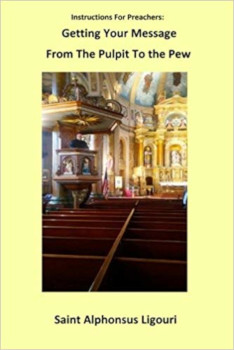
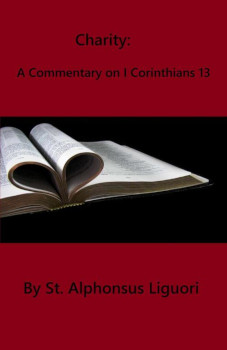
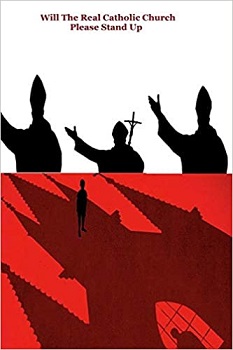










 Follow
Follow


